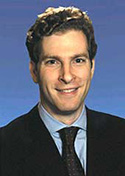CFR.org | Feldman: Guantanamo Detainees May be Difficult to Try, Depending on Hamdan Ruling
/ President George W. Bush, during a recent interview with the German ARD television network, said he "would like to end Guantanamo." But, he said, closing the facility depends on the Supreme Court's upcoming ruling in Hamdan v. Rumsfeld, which will determine whether detainees should be subject to civil or military trials. The case arose in 2004 after an indicted detainee—a Yemeni national and former driver of Osama bin Laden—Salim Ahmed Hamdan, challenged the legality of the military tribunals trying him.
President George W. Bush, during a recent interview with the German ARD television network, said he "would like to end Guantanamo." But, he said, closing the facility depends on the Supreme Court's upcoming ruling in Hamdan v. Rumsfeld, which will determine whether detainees should be subject to civil or military trials. The case arose in 2004 after an indicted detainee—a Yemeni national and former driver of Osama bin Laden—Salim Ahmed Hamdan, challenged the legality of the military tribunals trying him.
CFR Adjunct Fellow Noah Feldman, author of After Jihad and a law professor at New York University, discusses the legal issues at stake in the Hamdan decision, expected in late June. He says the case will decide whether military tribunals are constitutionally sufficient and warns that if the Supreme Court rules current trial procedures inadequate, it may be difficult to try many of the nearly 500 Guantanamo detainees because "much of the evidence—all of the evidence, in some cases—is gleaned from procedures that would not be admissible in ordinary courts."
Read the full text of the interview.
